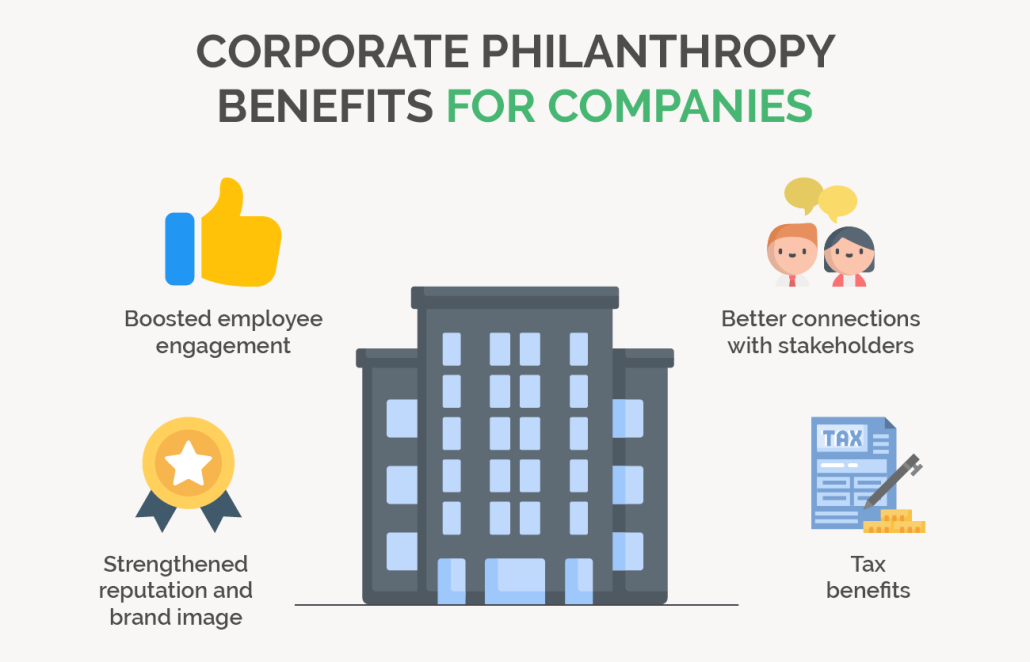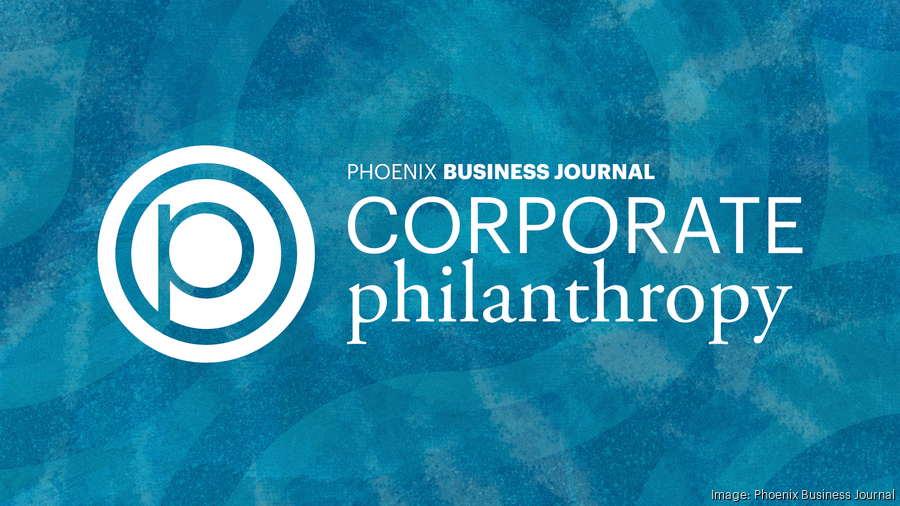The essential guide to corporate philanthropy strategies for community leaders
Checking Out Exactly How Corporate Philanthropy Shapes Brand Online Reputation and Consumer Commitment
Company philanthropy significantly affects brand track record and consumer loyalty. Firms that take part in genuine charitable efforts frequently see a favorable shift in just how consumers regard them. This positioning of values promotes depend on and emotional connections with target markets. Nonetheless, the performance of these kind initiatives can differ greatly. Recognizing what absolutely resonates with customers is important for brands seeking to boost their social effect and market setting. What methods will arise as vital for future success?
The Advancement of Corporate Philanthropy
As companies progressively acknowledge their duty in culture, the evolution of company philanthropy has transformed from simple philanthropic contributions to a strategic element of brand name identity. At first, firms involved in philanthropy mainly for tax benefits or to improve their public image. With time, this approach moved as stakeholders-- consisting of capitalists, workers, and consumers-- required a more authentic commitment to social responsibility.
Organizations began aligning their kind efforts with their core values and business purposes, resulting in more impactful and thoughtful payments. This adjustment has motivated companies to buy lasting methods and community development, promoting a sense of function that reverberates with customers.
Moreover, technological improvements have actually helped with transparency and interaction, permitting organizations to display their humanitarian initiatives much more effectively. Corporate philanthropy has actually arised as an integral component of business approach, with organizations welcoming the chance to positively influence culture while improving their overall brand name narrative.
The Impact of Philanthropy on Brand Name Understanding
While companies involve in kind initiatives to promote social excellent, these campaigns greatly form brand name perception among customers. Company philanthropy can boost a brand name's picture by associating it with positive social impact and community involvement. Customers frequently view brands that proactively take part in philanthropic tasks as even more trustworthy and liable. This understanding can affect getting choices, as customers may choose brands that demonstrate a dedication to social problems.

Building Emotional Links Through Granting
Corporate philanthropy serves as a powerful device for enhancing brand name identification by linking company values with area demands. Via critical giving, business can foster area engagement and produce common worths that reverberate with consumers on a psychological level. This method not just reinforces brand name reputation however additionally builds long-term connections in between companies and their stakeholders.
Enhancing Brand Identification
They not just contribute to social excellent but additionally create deeper emotional connections with their audiences when firms involve in philanthropic efforts. By aligning their brand name with philanthropic reasons, firms improve their identification and signal values that resonate with consumers. This alignment creates a story that exceeds solutions and products, welcoming clients to join a common mission. As consumers significantly focus on purpose-driven brands, business that actively take part in giving can distinguish themselves in a jampacked market. Such initiatives promote a feeling of loyalty amongst customers who feel personally connected to the brand name's worths. Ultimately, company philanthropy comes to be a vital tool for boosting brand identity, growing lasting partnerships based upon shared ideas and psychological involvement.
Fostering Neighborhood Involvement
Countless researches suggest that business participating in community-focused philanthropic efforts can significantly strengthen emotional connections with their stakeholders. By purchasing neighborhood projects and supporting social reasons, organizations grow a feeling of belonging and depend on within the area. This engagement promotes a positive brand photo, as clients appreciate firms that show genuine worry for social issues. Staff members typically really feel a lot more determined and proud to be connected with a company that focuses on neighborhood well-being. As a result, consumers are most likely to establish commitment in the direction of brand names that actively contribute to purposeful reasons. Inevitably, cultivating area involvement with philanthropy not only enhances brand name credibility but additionally constructs long lasting emotional ties that profit both the company and the community it serves.
Developing Shared Worths
Just how can businesses effectively produce shared worths that resonate with their stakeholders? Companies can achieve this by straightening their humanitarian efforts with their core objective and the passions of their neighborhoods. By participating in campaigns that attend to neighborhood requirements, companies cultivate emotional links with consumers, enhancing brand commitment. Partnering with non-profits that show shared values enhances the brand's picture and shows dedication to social responsibility. Furthermore, transparent communication concerning these initiatives allows stakeholders to see the substantial impact of their contributions. Ultimately, by integrating shared worths right into their company philanthropy, companies not just improve their reputations but likewise grow long lasting partnerships with consumers, leading to boosted commitment and depend on. This placement is important in modern consumer decision-making.
Situation Researches: Effective Philanthropic Campaigns
Analyzing successful philanthropic campaigns discloses different strategies that improve brand name track record. Impactful neighborhood initiatives, ingenious partnership designs, and long-lasting involvement techniques have actually shown reliable in promoting positive connections with consumers. These study highlight the relevance of thoughtful company offering in achieving both social and business objectives.
Impactful Area Initiatives
Several firms have efficiently leveraged kind projects to boost their brand online reputation while making a significant impact in their neighborhoods. A technology firm launched a digital literacy program in underserved communities, giving training and resources that empowered local residents. This effort not just added to neighborhood advancement but additionally placed the company as a socially liable leader. Similarly, a major food firm executed a hunger relief project, partnering with neighborhood nonprofits to distribute dishes to family members in requirement. This effort enhanced area connections and fostered client commitment. With these impactful efforts, companies have demonstrated their commitment to social obligation, successfully aligning their brand worths with the demands of the communities they serve, eventually boosting their general track record.
Cutting-edge Partnership Versions
The success of impactful area campaigns typically depends upon ingenious partnership versions that unite varied stakeholders to deal with complex social challenges. Study highlight exactly how corporations, non-profits, and federal government entities can collaborate effectively. For instance, an international firm partnered with a neighborhood non-profit to introduce an education program, merging resources and competence to enhance neighborhood literacy prices. Another instance included a technology firm and a healthcare company signing up with pressures to establish a telemedicine solution for underserved populations. These collaborations not just amplified the reach of kind efforts yet likewise enhanced the brands' reputations by aligning their goals with community needs. Inevitably, cutting-edge partnership versions work as a stimulant for meaningful change and foster more powerful links in between brands and their consumers.
Long-lasting Engagement Techniques

Measuring the ROI of Corporate Social Obligation
As companies progressively purchase company social duty (CSR) campaigns, comprehending the roi (ROI) associated with these efforts comes to be necessary. Gauging ROI in CSR is complex, frequently incorporating both qualitative and measurable metrics. Financial returns can be examined with increased sales, enhanced brand name loyalty, get more and boosted staff member spirits, which can cause higher efficiency. In addition, firms might analyze cost financial savings connected to sustainable methods, such as decreased waste or energy consumption.
Qualitatively, the influence of CSR on brand name reputation can be examined via consumer understanding studies and social media sites belief analysis. Surveys can supply insights into how CSR tasks influence customer commitment and count on. Benchmarking versus industry requirements can help organizations gauge their CSR efficiency - corporate philanthropy. Inevitably, an extensive technique to determining ROI makes it possible for companies to make enlightened decisions about future CSR investments, lining up approaches with both financial efficiency and social influence
Customer Expectations and Business Duty
Increasingly, consumers anticipate companies to operate with a strong sense of company duty, viewing moral techniques as a prerequisite for brand name commitment. This shift in assumption shows an expanding recognition of ecological and social concerns, leading clients to favor brand names that straighten with their values. Customers are extra inclined to sustain business that participate in clear techniques, demonstrate sustainability, and contribute favorably to their communities.
In addition, social media amplifies these expectations, allowing consumers to share their experiences and point of views swiftly. Brand names that fall short to fulfill these honest criteria take the chance of reaction, while those that embrace corporate responsibility commonly enjoy superior reputation and client commitment. As consumers demand accountability, companies need to integrate corporate social duty into their core methods, prioritizing ethical actions not simply as an advertising and marketing approach, yet as a fundamental facet of their operations. This placement can ultimately result in stronger brand fondness and sustained success in open markets.
Future Fads in Company Philanthropy and Brand Name Loyalty
The landscape of company philanthropy is developing, influenced by the elevated customer assumptions bordering company duty. Firms are progressively incorporating social influence right into their core organization methods, not just as a supplementary task. Future patterns suggest a shift towards openness, with brands sharing in-depth info regarding their humanitarian campaigns and their straight effects on areas.
Innovation is playing an important duty, allowing real-time interaction between customers and brand names. Social media site platforms promote straight interaction, allowing consumers to articulate their assumptions and hold brands accountable. Additionally, more visit this site right here youthful generations, specifically Millennials and Gen Z, focus on sustainability and ethical techniques, driving services to adopt more conscientious techniques.
As corporate philanthropy becomes associated with brand identity, firms that authentically straighten their missions with social requirements are most likely to foster stronger client commitment. This merging of values will eventually shape the future of business reputation and consumer connections in a progressively diligent industry.
Often Asked Questions
Exactly How Do Customers Discover a Company's Philanthropic Initiatives?
Consumers discover a business's kind efforts with numerous channels, including social networks, press launches, area events, and word-of-mouth. These opportunities promote understanding, making it possible for individuals to engage with brands that align with their worths and rate of interests.
What Role Does Worker Participation Play in Business Philanthropy?
Employee participation in corporate philanthropy enhances involvement, promotes a feeling of possession, Visit Your URL and enhances team cohesion - corporate philanthropy. This involvement typically enhances the influence of charitable initiatives, causing higher understanding and assistance for the business's philanthropic efforts
Can Corporate Philanthropy Backfire on a Brand name's Credibility?
Company philanthropy can undoubtedly backfire on a brand's online reputation if viewed as insincere or opportunistic. Adverse public understanding may emerge, bring about diminished trust fund and loyalty amongst consumers who focus on authenticity in corporate actions.
Are Smaller Business as Efficient in Philanthropy as Larger Corporations?
Smaller sized business can be just as effective in philanthropy as larger corporations, typically demonstrating dexterity and authenticity. Their localized efforts might reverberate more deeply with communities, promoting genuine connections regardless of limited sources compared to their larger counterparts.
Just How Can Firms Pick the Right Triggers to Assistance?
Firms can pick the appropriate trigger by aligning their worths with area demands, examining stakeholder rate of interests, and reviewing potential impact. This critical method promotes credibility, enhances interaction, and enhances links with customers and the broader neighborhood.
While business involve in philanthropic efforts to promote social good, these campaigns greatly shape brand perception among customers. As customers significantly focus on purpose-driven brand names, companies that actively involve in providing can differentiate themselves in a crowded market. Lots of business have efficiently leveraged kind campaigns to boost their brand credibility while making a purposeful effect in their areas. Increasingly, customers anticipate firms to run with a solid feeling of corporate responsibility, watching honest methods as a prerequisite for brand name commitment. As corporate philanthropy comes to be identified with brand identity, companies that authentically straighten their missions with social demands are most likely to foster more powerful customer loyalty.